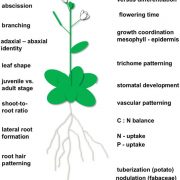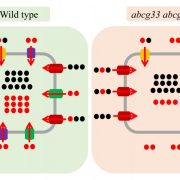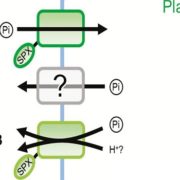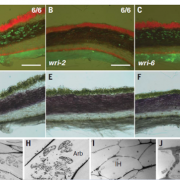NRT1.1 involved in balance between NH4+ uptake and assimilation ($) (Plant Physiol)
 Ammonium (NH4+) is an inorganic nitrogen source that is the preferred source for some plant species (e.g., rice and tea) but can be toxic in high amounts. The nitrate transporter NRT1.1 is involved in mediating the effects of toxic NH4+, as well as functioning in NO3– and auxin transport, NO3– signaling and stomatal movement. But the role of NRT1.1 in mediating NH4+ toxicity is still unclear. Thus, Jian and colleagues used Arabidopsis mutants, genetic analyses and enzyme analyses to elucidate the role of NRT1.1 in NH4+ mediation. Under (NH4)2SO4 stress, NRT1.1 induced the expression of various NH4+-related transporters and NH4+ assimilation genes. High (NH4)2SO4 caused wild-type plants to grow poorly compared to the NRT1.1 mutants. For wild-type Arabidopsis, treatment with (NH4)2SO4 induced toxicity responses, such as ethylene synthesis and senescence. Under (NH4)2SO4 stress, the NRT1.1 mutants showed a reduction in NH4+ accumulation and an enhancement in NH4+ assimilation. This paper describes that NH4+ toxicity is related to a nitrate-independent signaling function of NRT1.1, resulting in altered NH4+ accumulation and metabolism. (Summary by Julia Miller) Plant Physiology: 10.1104/pp.18.00410
Ammonium (NH4+) is an inorganic nitrogen source that is the preferred source for some plant species (e.g., rice and tea) but can be toxic in high amounts. The nitrate transporter NRT1.1 is involved in mediating the effects of toxic NH4+, as well as functioning in NO3– and auxin transport, NO3– signaling and stomatal movement. But the role of NRT1.1 in mediating NH4+ toxicity is still unclear. Thus, Jian and colleagues used Arabidopsis mutants, genetic analyses and enzyme analyses to elucidate the role of NRT1.1 in NH4+ mediation. Under (NH4)2SO4 stress, NRT1.1 induced the expression of various NH4+-related transporters and NH4+ assimilation genes. High (NH4)2SO4 caused wild-type plants to grow poorly compared to the NRT1.1 mutants. For wild-type Arabidopsis, treatment with (NH4)2SO4 induced toxicity responses, such as ethylene synthesis and senescence. Under (NH4)2SO4 stress, the NRT1.1 mutants showed a reduction in NH4+ accumulation and an enhancement in NH4+ assimilation. This paper describes that NH4+ toxicity is related to a nitrate-independent signaling function of NRT1.1, resulting in altered NH4+ accumulation and metabolism. (Summary by Julia Miller) Plant Physiology: 10.1104/pp.18.00410









